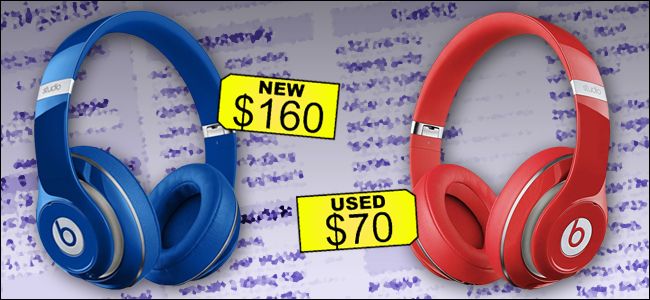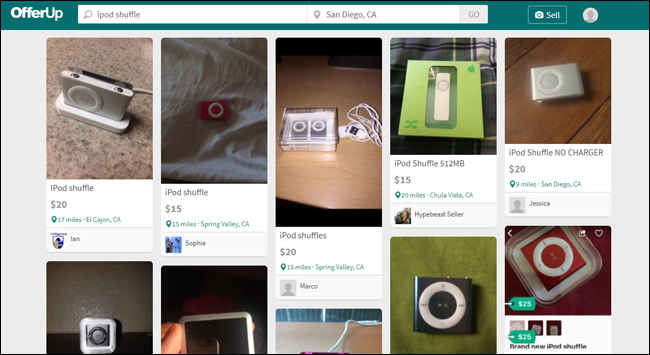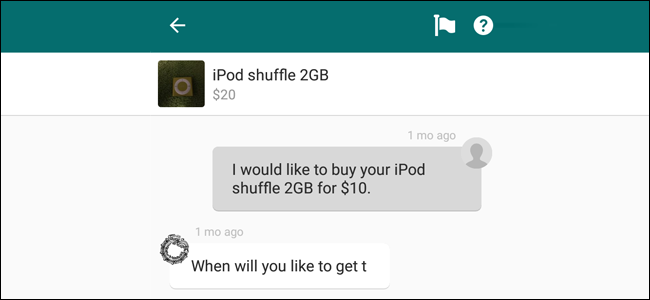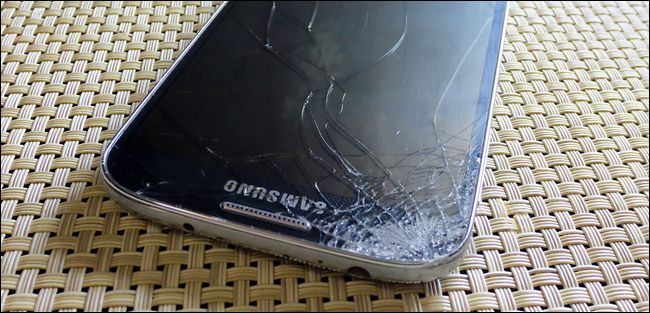Quick Links
Technology is expensive. We geeks love to shower ourselves with new gadgets, but it's awfully costly. There are a lot of ways to save money on your tech addiction, but none of them beat buying used.
Why Buying Used Is Awesome
I'm always looking for ways to save money. I'm rarely satisfied with a simple coupon or sale; I want insane deals. If it isn't insane, I just don't feel victorious.
Big "events" like Black Friday and Prime Day can be okay for shopping, but they'll never match what you can get used. Here are some examples of great tech deals I've gotten recently:
- A Marantz A/V receiver for $35 (originally $799). It's a bit old (released in 2008), and doesn't support some newer tech like 4K and HDR, but I haven't upgraded to those yet anyway---and it was easily the cheapest HDMI receiver I'd found, thanks to my local e-waste center. This is probably the best deal I've ever gotten. A modern HDMI receiver would cost at least $200, for features I don't even need right now.
- A pair of Yamaha HS50M speakers for $150 (instead of $400 for a pair of newer HS5s). Instead of buying a new set of monitors, I got the previous generation used through Guitar Center for less than half off. They work and sound great.
- A Dell 2400MP projector for $50 (originally $950). Again, this one's a bit old (released in 2006), and just shy of being HD, but a nearby school was getting rid of a few, and its 3,000 lumen brightness makes it perfect for backyard movie nights---the result looks much better than its 1024x768 resolution would imply, and a comparably bright projector would cost well over $100 new.
- A pair of Bose SoundSport earphones for $20 (originally $100), a 4th generation iPod Shuffle for $10 (originally $50), and a Nike+ SportWatch for $25 (originally $150). I guess these folks just weren't getting any interest on these items, so they were easy to negotiate down---and now I have a serious workout kit for very little cash.
- A few Xbox 360 controllers for $10 (currently $30 new from most stores). I only needed these for a one-day Rocket League party with a few friends, but at $10, it was well worth it. Thanks to OfferUp, they were cheaper than the pre-owned ones from GameStop, and these ones don't even smell like weed.
And those are just a handful of the deals I've found.
This works for all kinds of items, from the little stuff to bigger purchases like laptops, TVs, or even an Xbox One or PlayStation 4. I can't guarantee every single item you want is available for some incredible discount (Apple products in particular keep their high value really well), but if you keep your eyes out, do your due diligence, and negotiate well, you can get a lot of stuff for way cheaper than you'd get it new---or, frankly, cheaper than most other people get it used.
Note, however, that most of this article discusses strategies that are hyper local, which means you're going to have much better luck if you live in or near a decent-sized city. That's just how these things go (more people = more items and more competition). I still recommend giving used gear a shot, but just note that if you're in a rural area, it might be a bit more difficult.
How to Score Those Great Deals
There's no secret formula to getting these good deals, and you'll have to find what works best in your geographic region and on the sites you choose. Yes, the process takes a bit more work (and patience!), but it's well worth it in the end. Here are some things to keep in mind.
Cast a Wide Net: Craigslist Isn't the Only Site to Search
First, don't just look at the old standbys. Craigslist is great, and I've gotten some great deals there. But you should also check out other options. OfferUp, for example, is a similar site with a prettier-looking interface and an easy-to-use app, so some people use it instead of Craigslist when they're looking to sell. There are a fair number of items on it, but not enough users to generate a ton of interest in them---which means you can often get items for an absolute steal because they've been listed for weeks or months. (It also has negotiation features built-in, so it's generally expected by its users.) LetGo is a similar app with more users, but a worse interface/search engine. I recommend searching Craigslist, OfferUp, and LetGo regularly for the stuff you want in order to cast as wide a net as possible.
There are other places to look though, too. For example, here in San Diego, the University of San Diego has an e-waste center that sells any working items that people bring in. An organization called Free Geek performs similar services in many other cities, including Portland, Chicago, and more. Search your local area to see what kinds of electronics recycling organizations are nearby---you'd be surprised at the deals you can find there. Even Goodwill has an online marketplace that you can search, though the deals are a bit more hit and miss. Facebook Marketplace is starting to become popular as well.
If you're looking for a specific type of product, there may be sites or communities dedicated to it specifically. Swappa is a great place to buy used smartphones, for example. HardForum and /r/hardwareswap are communities for buying and selling PC hardware, and /r/mechmarket is for mechanical keyboards (talk about niche!). If there's a hobby based around the product in question, there's probably a community dedicated to buying and selling.
Lastly, you never know what chain stores have used marketplaces. My computer speakers were bought through Guitar Center's used marketplace, which I didn't even know existed until I asked at the store. When in doubt, ask---you never know what you might find.
Be Patient: Set Up Alerts and Bookmarks
Once you have something you want to buy, search for it on all of the above sites (and any others you find). The goal is to cast as wide a net as possible so when a good deal goes up, you're able to snatch it. The fewer sites you search, the less likely you are to find the good stuff.
You may not find what you're looking for at the price you want right away. So I recommend bookmarking those searches in a folder so you can easily check back with them every couple of days or so. (For Craigslist, you can even set up an IFTTT alert when new items are posted matching your search terms.)
Eventually, provided you have halfway realistic expectations, you'll see an item you want at a pretty great price---possibly even lower than most people are selling it for. Maybe someone's trying to get rid of it fast, or maybe someone's not getting any bites so they lowered the price of an already-listed item. These things happen all the time. The key is being patient until the item you want gets closer to your price range.
NOTE: Keep in mind that there are a few brands---like Rolex, for example---that may be more prone to counterfeiting. Make sure you do your due diligence in learning how to spot counterfeits before you accept a deal that seems too good to be true.
Negotiate: Most People Will Take What They Can Get
Lastly, when you search, be sure to search a little above your price range. Many of these sites (excepting larger marketplaces like Goodwill and Guitar Center) allow for---and even expect you to---negotiate. You can almost always bring someone's price down, especially if the item has been listed for a while. Those Bose earbuds I mentioned earlier? They were listed for $35, I talked him down the last 15 dollars. The iPod Shuffle was originally listed for $20; I talked her down to $10. This is a key step, and it can be the difference between a great deal and a jaw-droppingly insane deal.
Negotiation isn't hard, especially if you're doing it over text or email. Just ignore the fact that most Craigslist sellers treat it like a hostage negotiation with two-word misppelled sentences. Make them an offer lower than what they're selling it for, and maybe even a bit lower than your hoped-for price---they might negotiate you up from your original offer to meet in the middle. "Can you do $10?" is a perfectly acceptable message, and frankly more formal than most people will receive.
Sometimes they're willing to negotiate, sometimes they aren't---but if you don't even ask, you'll be missing out. Negotiating can get you five to 10 extra bucks out of a smaller item, and even more on bigger, more expensive items. Remember: the worst that happens is that someone says they're firm, and you either meet their price or wait for something lower.
Just don't get discouraged if people don't respond to your offers. People are often bad about unlisting posts when an item is sold, so they'll just ignore any messages after that point. Keep messaging people, and eventually you'll get someone who responds and is willing to negotiate. Patience is key.
What If My Stuff Breaks?! I Need a Warranty!
Whenever I mention my affinity for buying used, I'm almost always met with groans. "But Craigslist is such a hassle," they'll say, or "What if it smells like some person's cat?!" (Pro tip: Clorox is your friend.)
By far the most common fear, though, is that they'll buy an item, it'll break, and they'll have wasted all that money on a dead gadget with no warranty.
This is a valid point, but in my experience, this isn't very common. Only once have I ever bought a used item that broke soon after, and it was partially due to my own young naive stupidity (don't buy hard drives used, people). But most people selling this stuff are just like you: people who spent a lot of money on a gadget and don't use it as much as they thought, so they're trying to squeeze a few bucks out of it instead of throwing it away. They're not trying to take you for a ride (usually).
But things can still go wrong, and you won't always get the protection of a warranty with these items. Even if you do still have a warranty, you won't get the extended warranty offered by your credit card. Part of getting that insane deal is taking that risk, however small.
But here's the thing: if you get good enough deals, it doesn't matter if one of your items breaks. You can buy it again and still save money.
Most of the time, your stuff will work fine and last pretty well (provided you're buying something that was well-built in the first place). And if you buy a lot of stuff used, you're saving so much money that---if and when something does break---you'll be able to replace it and still come out ahead in the long run (much the same way you end up saving money by not buying extended warranties). You're only in trouble if a lot of your used stuff breaks, which is rather unlikely.
You Don't Need to Buy Everything Used, Just Be Open to It
None of this is to say that you should do this for everything you buy. If you're buying a product you know has a bad track record of failures (Microsoft Surface, anyone?) it might be worth it to get that warranty. Or maybe there's a very specific model of TV you want, and you're having trouble finding it used. There's no shame in buying something new---just give used a chance, and be discerning about what actually matters. Sure, I could have bought an iPod Shuffle in my favorite color (blue), but if I can get a used green one for $10 with someone else's name engraved on the back...I don't think I'm going to shed many tears over the color. Buy according to your needs, and you can save a lot of money.
Photo credit: Michael Mandiberg/Flickr




